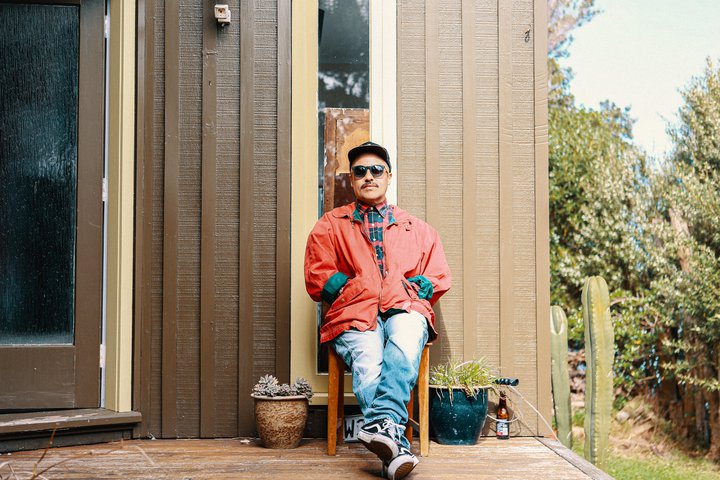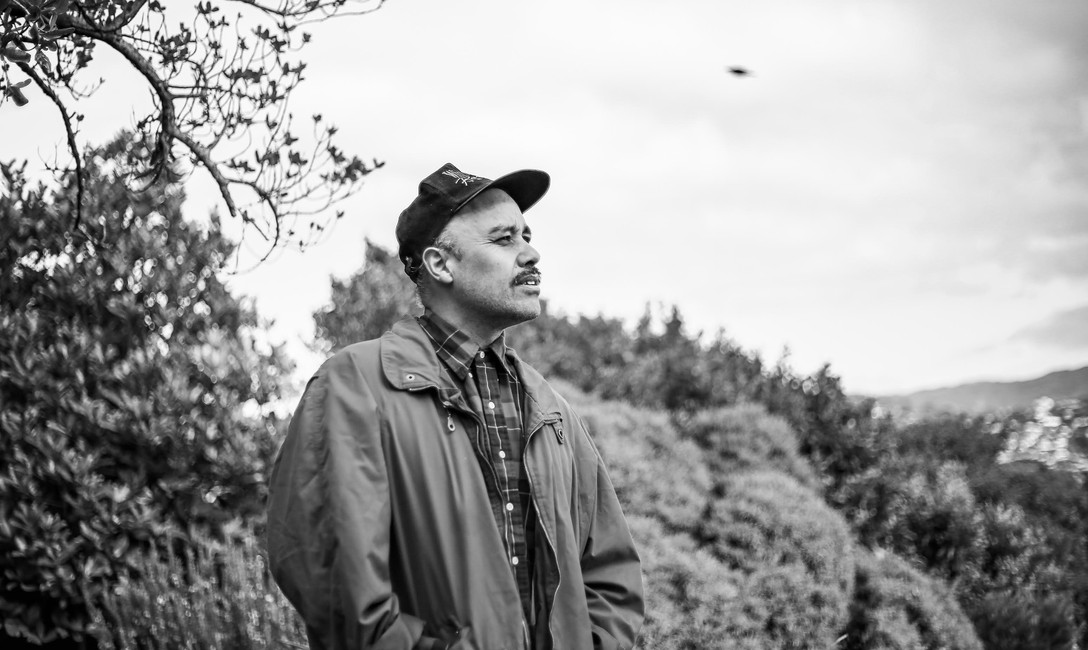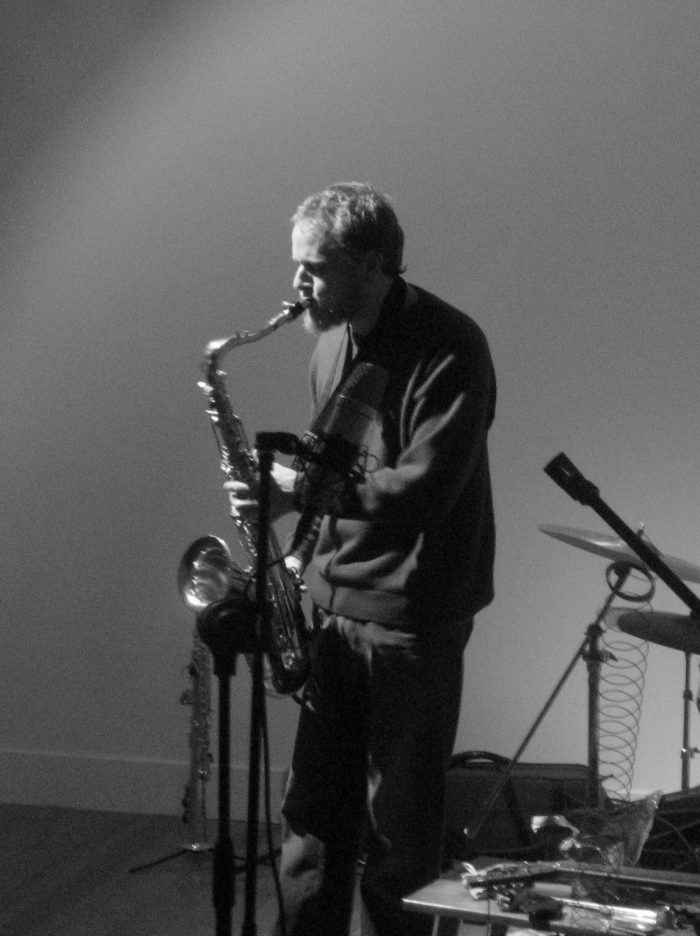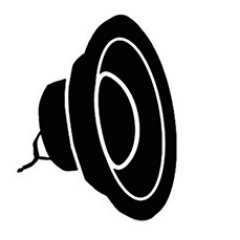![]()
Music is Nothing… Perhaps?
A Conversation between Riki
Gooch (NZ) and Reuben
Derrick (NZ)
Originally published in ‘CONTINENTAL THOUGHT & THEORY: A JOURNAL OF INTELLECTUAL FREEDOM
Thinking Music: Praxis and Aesthetics’ Journal, UC.
RD: You and I have previously discussed what music is and what forms it can
potentially take. I distinctly remember you once saying that aside from being an
interface for human expression, music is actually nothing. It doesn't exist as an
object. So I'm really interested in hearing about some examples when, as an artist
you have experienced music as being a means of human expression, and also about
it not existing as a specific object. I am thinking that for some people music does
exists as a score or an LP or some kind of object.
RG: Yes. I often think, and maybe you feel the same way, that the musical world enables you to absorb all the different experiences that can be encountered; such as the different situations and environments that you find yourself in as a musician. I often notice this on tour that you’re out there on the road and realizing, what am I doing? I’m playing an instrument, sure but I'm also interacting with this interface to express some idea or event. To me, music becomes possibly anything and materializes as an artefact, or as a form of marketing or as a genre or whatever. But music at its essence, I feel like is just kind of nothing without human involvement and the listener, or whoever is involved in engaging in that process. That’s how I like to imagine music, thinking of it in its purest form. Often I think of it as that the interface that you tap into. The other side to this thinking is that music exists all of the time and that it's this continuous thread, and we decide to engage with it by communicating with other musicians, or by ourselves, or from within our environment. It is a stream to tap into, whether this is a communal stream or not. For me, music more of an imagined state.
RD: Absolutely, music can occur inside your own thoughts. One can have some very intense musical experiences, which are completely in your own mind. This can provoked by what you're listening to whether it is actually playing an instrument or how you perceive something acoustically in the world, I guess. Yeah, so in the second question, “can we say that music can be thought?” I guess this follows on to that, and you [suggest that] “perhaps it needs to involve a process of examination, development and practice”. So does this allow us to think of music as an abstraction, something that is thought, something that does occur in our head. Does that make sense?
RG: Yes, yes, for sure. I think music is thinking. Once we think of an idea, or as you're saying, as soon as we engage with another musician or with an environment, it's already floating around in one’s mind. Obviously there's a purpose to this. Whatever that purpose is, whether it is to sit out [not play], whether that purpose is to jump straight in and play as fast as possible, whether that's to really reflect back what you're hearing, or whether it’s an immediate thought, it is an intention of thought or a question of how can I evolve this idea? How can I do this better? How can I...? And then really bringing it into the forefront of the mind to examine it; to act upon it. For example, I might think that I want to be more polyrhythmic. What does this mean? More polyrhythmic? Do I mean “better”? So music is always an examination of what you do and what you mean by doing it – if you want to strive for meaning at all. And I think that music definitely resides within the realm of thinking, and practice, and all the forms that emanate. You know, that's what I always get so excited about; all these different possibilities and the ideas people have to bring to the musical act. It's amazing.
RD: Yes, it surely is.
RG: Also, this is what I mean by music being “nothing”. I think the more we can think of it as without a set of rules, such as structured by tempered pitch and different musical systems. But essentially without all that stuff holding it together, it's nothing! I think this is a nice way to think of it as a consciousness also.
RD: Yes, it is interesting because I think sometimes sound just arrives… The musical thinking takes place as a response to it. What is that sound? How did it get within ear shot? How can I provide an interpretation of it?
RG: A state of flow , perhaps?
RD: Perhaps… Sometimes, if I’m thinking of a particular rhythm and attempting to figure out how to add this up, it becomes a very pragmatic thing. It becomes a different kind of exercise: I've got this musical problem, and I need to figure out how to solve it, to make it work, how is it going to sound?
RG: Yes! Is it going to work!? The big question. And that's the benefit of experience, isn't it? Practice and repetition allow a muscle memory that we of take on as we progress through our musical lives. When I started playing timpani, I was a young man. I had no concept back then of about thinking about anything else, apart from learning how to read a chart properly, you know, surviving just on that, not even knowing all this other stuff that I think about now. So we have the ability to be critical of one’s own work: to see where the problems are and know what to look for. These are all tools that we add, just [to] be able to play five note paradiddles or whatever. So that practice of a flow state. The more we engage with these different devices the more the thinking of an idea and the physical act of music become narrow, almost joined, closer at least and more automatic.
RD: What you say reminds of the very physicality of playing an instrument.. there’s kind of an athletic element of music-making which I enjoy. Bringing the body directly into the process of exploring an idea.
RG: That's right. The body and the instrument can have an intimacy. It's one of the wonderful aspects about practising music: you get the opportunity to really have this physical expression and dialogue between conscious thought and its intention. At the same time there are other aspects – I even take note of those cheap articles which purport that drummers are good with logic! No doubt a drummer wrote this idea!
RD: Absolutely! But the conceptualisation between the differences composer, performer and listener as being reliant on one another is important to the sound arriving and travelling through some portal to catch what we hear as music. Regardless of whether I'm playing or listening, I can like a composer, depending on how you choose to approach what you are hearing.
RG: That’s right. And it depends on what the listener does with what they hear. A good example is buying a vinyl copy of something that's at forty-five RPM, but you play it at thirty-three because you like it slower. By doing this you have already altered the composition and the whole intention of the work. Therefore, slowing the speed almost itself an act of composition. If you're dancing at a club and you want to stand closer to the speakers to hear more bass, you're engaging with the music in a particular way. Similarly with being a composer, too, especially in the traditional sense. The composer writes these intentions and instructions, but the success of the composition might really come down to whether the orchestra having a good day. For example, what is the weather doing? Is the barometric pressure messing with intonation and tunings? What is the audience is like? There are all these kind of different elements where the composer becomes the audience, when the performers’ become the audience when they're listening to audience response, or gauging or reading the energy of the room. I know these parts, as you said, all interchangeable and need each other.
RD: That's how I would understand music as a praxis.
RG: Definitely.
RD: Part of that praxis is how one appreciates a composition? Perhaps not so much for its beauty but rather for something else which seems to work or resonate – or clash. For example, a mathematician might love a particular equation because it speaks a certain truth in its own procedure and trajectory. There are those who study a music score and appreciate it in a similar way. It is similar for a particular record label or festival as having quite a defined aesthetic.
RG: Yes, aesthetics contain little markers, we could say. And here we think of the idea of music as being nothing. All one has is an imagination to work with in some ways and working with what you have. Certain components of music-making might belong together, others not so much. Every participant in music-making is mapping their way through their own interpretations of what the music should constitute. For example, even free music is not truly free because it is still confined as a particular aesthetic.
RD: Yes, even in free improvised music, there are particular, artists, groups or scenes, where there is apparent a particular aesthetic mode taking place.
RG: That’s right, Yeah. I always find it amusing that free music is categorized as such in such places like a record shop! I think it's strange…
RD: It could still be almost anything, couldn't it?
RG: They should just have “nothing” there or “something else”! I suppose it is about making that kind of music presentable and as part of a continuum. But I honestly never ever sit down and think, “I'm going to make something like this, in this style or...”
RD: It depends, presumably on if you're playing with other people, then you probably have an idea in your head about what they as musicians sound like most of the time or what they might sound like when you play with them... even if it is the first time. I find it challenging and invigorating when I meet somebody new to play with, we may have never heard of each other but suddenly you are both on the spot and, make “something” in front of all these people!
RG: That's right. Even though I think of music as essentially nothing, except for whatever we imagine it to be and how would we engage with this nothingness. At the same time I still imagine it being this sort of massive universe. It's always worthwhile to rein music in and just observe it more closely... But I am in a position where I don't make music for money... I might do some jobs, for a short film for example, but commerce is not my intention... I am simply committed to exploring and to serve music.
RD: I appreciate what you say about music being a map for aesthetics; it's such a nice way to put it. I find myself playing in lots of different situations with different people and that idea makes perfect sense to me; you have to find where you are on the map sometimes.
RG: It it's funny because sometimes! For example, I did a country record a few years ago where I found myself doing a drum session for a friend of a friend. Brushes and a big bass drum and that kind of quite Nashvilley sort of backbeat...really straightforward. The rest of the players are accountant so music is a hobby for them. We kept it simple, even though it should always be that anyway. So regardless you're helping to contribute to create this kind of marker, that sits on a map, even if it is “Dad rock”. Country, Nashville!
RD: Thank so much, Riki. It is always great to talk with you about our shared love for music.
RG: Always, Reuben! Thank you!
RG: Yes. I often think, and maybe you feel the same way, that the musical world enables you to absorb all the different experiences that can be encountered; such as the different situations and environments that you find yourself in as a musician. I often notice this on tour that you’re out there on the road and realizing, what am I doing? I’m playing an instrument, sure but I'm also interacting with this interface to express some idea or event. To me, music becomes possibly anything and materializes as an artefact, or as a form of marketing or as a genre or whatever. But music at its essence, I feel like is just kind of nothing without human involvement and the listener, or whoever is involved in engaging in that process. That’s how I like to imagine music, thinking of it in its purest form. Often I think of it as that the interface that you tap into. The other side to this thinking is that music exists all of the time and that it's this continuous thread, and we decide to engage with it by communicating with other musicians, or by ourselves, or from within our environment. It is a stream to tap into, whether this is a communal stream or not. For me, music more of an imagined state.
RD: Absolutely, music can occur inside your own thoughts. One can have some very intense musical experiences, which are completely in your own mind. This can provoked by what you're listening to whether it is actually playing an instrument or how you perceive something acoustically in the world, I guess. Yeah, so in the second question, “can we say that music can be thought?” I guess this follows on to that, and you [suggest that] “perhaps it needs to involve a process of examination, development and practice”. So does this allow us to think of music as an abstraction, something that is thought, something that does occur in our head. Does that make sense?
RG: Yes, yes, for sure. I think music is thinking. Once we think of an idea, or as you're saying, as soon as we engage with another musician or with an environment, it's already floating around in one’s mind. Obviously there's a purpose to this. Whatever that purpose is, whether it is to sit out [not play], whether that purpose is to jump straight in and play as fast as possible, whether that's to really reflect back what you're hearing, or whether it’s an immediate thought, it is an intention of thought or a question of how can I evolve this idea? How can I do this better? How can I...? And then really bringing it into the forefront of the mind to examine it; to act upon it. For example, I might think that I want to be more polyrhythmic. What does this mean? More polyrhythmic? Do I mean “better”? So music is always an examination of what you do and what you mean by doing it – if you want to strive for meaning at all. And I think that music definitely resides within the realm of thinking, and practice, and all the forms that emanate. You know, that's what I always get so excited about; all these different possibilities and the ideas people have to bring to the musical act. It's amazing.
RD: Yes, it surely is.
RG: Also, this is what I mean by music being “nothing”. I think the more we can think of it as without a set of rules, such as structured by tempered pitch and different musical systems. But essentially without all that stuff holding it together, it's nothing! I think this is a nice way to think of it as a consciousness also.
RD: Yes, it is interesting because I think sometimes sound just arrives… The musical thinking takes place as a response to it. What is that sound? How did it get within ear shot? How can I provide an interpretation of it?
RG: A state of flow , perhaps?
RD: Perhaps… Sometimes, if I’m thinking of a particular rhythm and attempting to figure out how to add this up, it becomes a very pragmatic thing. It becomes a different kind of exercise: I've got this musical problem, and I need to figure out how to solve it, to make it work, how is it going to sound?
RG: Yes! Is it going to work!? The big question. And that's the benefit of experience, isn't it? Practice and repetition allow a muscle memory that we of take on as we progress through our musical lives. When I started playing timpani, I was a young man. I had no concept back then of about thinking about anything else, apart from learning how to read a chart properly, you know, surviving just on that, not even knowing all this other stuff that I think about now. So we have the ability to be critical of one’s own work: to see where the problems are and know what to look for. These are all tools that we add, just [to] be able to play five note paradiddles or whatever. So that practice of a flow state. The more we engage with these different devices the more the thinking of an idea and the physical act of music become narrow, almost joined, closer at least and more automatic.
RD: What you say reminds of the very physicality of playing an instrument.. there’s kind of an athletic element of music-making which I enjoy. Bringing the body directly into the process of exploring an idea.
RG: That's right. The body and the instrument can have an intimacy. It's one of the wonderful aspects about practising music: you get the opportunity to really have this physical expression and dialogue between conscious thought and its intention. At the same time there are other aspects – I even take note of those cheap articles which purport that drummers are good with logic! No doubt a drummer wrote this idea!
RD: Absolutely! But the conceptualisation between the differences composer, performer and listener as being reliant on one another is important to the sound arriving and travelling through some portal to catch what we hear as music. Regardless of whether I'm playing or listening, I can like a composer, depending on how you choose to approach what you are hearing.
RG: That’s right. And it depends on what the listener does with what they hear. A good example is buying a vinyl copy of something that's at forty-five RPM, but you play it at thirty-three because you like it slower. By doing this you have already altered the composition and the whole intention of the work. Therefore, slowing the speed almost itself an act of composition. If you're dancing at a club and you want to stand closer to the speakers to hear more bass, you're engaging with the music in a particular way. Similarly with being a composer, too, especially in the traditional sense. The composer writes these intentions and instructions, but the success of the composition might really come down to whether the orchestra having a good day. For example, what is the weather doing? Is the barometric pressure messing with intonation and tunings? What is the audience is like? There are all these kind of different elements where the composer becomes the audience, when the performers’ become the audience when they're listening to audience response, or gauging or reading the energy of the room. I know these parts, as you said, all interchangeable and need each other.
RD: That's how I would understand music as a praxis.
RG: Definitely.
RD: Part of that praxis is how one appreciates a composition? Perhaps not so much for its beauty but rather for something else which seems to work or resonate – or clash. For example, a mathematician might love a particular equation because it speaks a certain truth in its own procedure and trajectory. There are those who study a music score and appreciate it in a similar way. It is similar for a particular record label or festival as having quite a defined aesthetic.
RG: Yes, aesthetics contain little markers, we could say. And here we think of the idea of music as being nothing. All one has is an imagination to work with in some ways and working with what you have. Certain components of music-making might belong together, others not so much. Every participant in music-making is mapping their way through their own interpretations of what the music should constitute. For example, even free music is not truly free because it is still confined as a particular aesthetic.
RD: Yes, even in free improvised music, there are particular, artists, groups or scenes, where there is apparent a particular aesthetic mode taking place.
RG: That’s right, Yeah. I always find it amusing that free music is categorized as such in such places like a record shop! I think it's strange…
RD: It could still be almost anything, couldn't it?
RG: They should just have “nothing” there or “something else”! I suppose it is about making that kind of music presentable and as part of a continuum. But I honestly never ever sit down and think, “I'm going to make something like this, in this style or...”
RD: It depends, presumably on if you're playing with other people, then you probably have an idea in your head about what they as musicians sound like most of the time or what they might sound like when you play with them... even if it is the first time. I find it challenging and invigorating when I meet somebody new to play with, we may have never heard of each other but suddenly you are both on the spot and, make “something” in front of all these people!
RG: That's right. Even though I think of music as essentially nothing, except for whatever we imagine it to be and how would we engage with this nothingness. At the same time I still imagine it being this sort of massive universe. It's always worthwhile to rein music in and just observe it more closely... But I am in a position where I don't make music for money... I might do some jobs, for a short film for example, but commerce is not my intention... I am simply committed to exploring and to serve music.
RD: I appreciate what you say about music being a map for aesthetics; it's such a nice way to put it. I find myself playing in lots of different situations with different people and that idea makes perfect sense to me; you have to find where you are on the map sometimes.
RG: It it's funny because sometimes! For example, I did a country record a few years ago where I found myself doing a drum session for a friend of a friend. Brushes and a big bass drum and that kind of quite Nashvilley sort of backbeat...really straightforward. The rest of the players are accountant so music is a hobby for them. We kept it simple, even though it should always be that anyway. So regardless you're helping to contribute to create this kind of marker, that sits on a map, even if it is “Dad rock”. Country, Nashville!
RD: Thank so much, Riki. It is always great to talk with you about our shared love for music.
RG: Always, Reuben! Thank you!

Image Credit: Celeste
Ngā Tuone, Riki Gooch

Riki Pirihi-Gooch. Image courtesy of the artist.

Reuben Derrick


